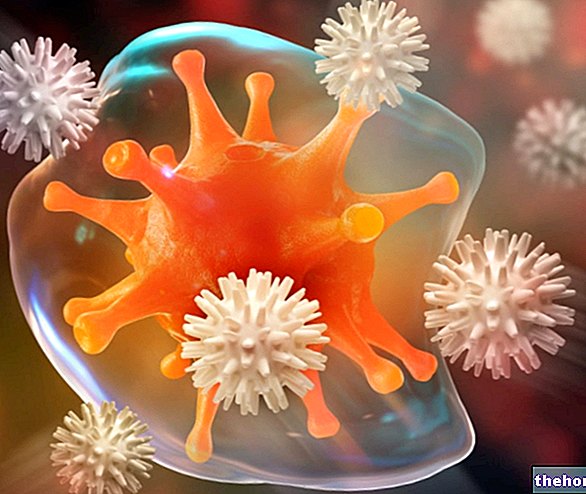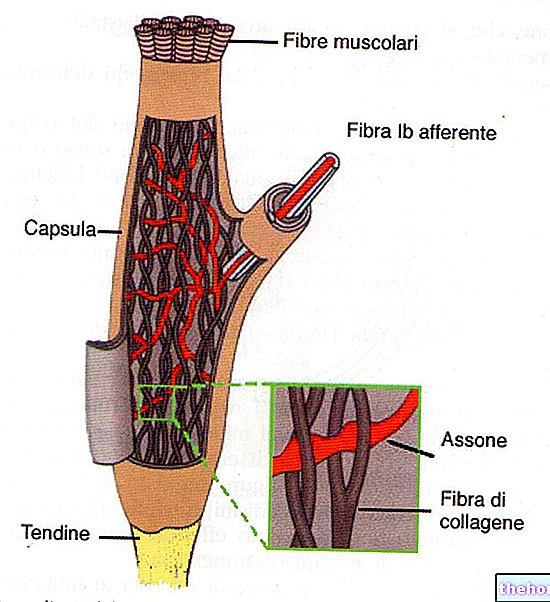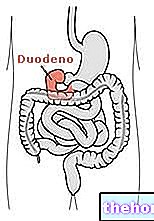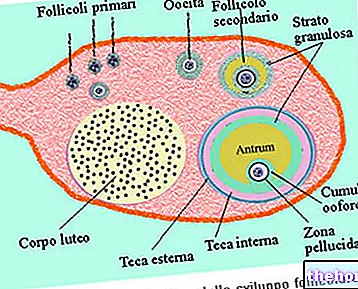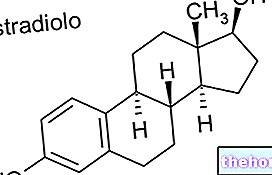Generality
Calcitonin is a polypeptide hormone secreted by the parafollicular cells (C cells) of the thyroid.

This hormone acts at the bone and renal level, exercising functions in many ways opposite to those covered by parathyroid hormone. In particular, calcitonin increases the renal excretion of phosphorus and stimulates the reabsorption of calcium, favoring its deposition in the bones.
Thanks to these properties, calcitonin opposes the excessive rise in calcium (a parameter that expresses the concentration of Ca2 + in the plasma), increasing bone mineralization.
In a single term, calcitonin has hypocalcemic properties.
As expected, the secretion of this hormone increases in response to hypercalcemia, and vice versa.
By virtue of its mineralizing action, calcitonin is used in the therapy of Paget's disease, a genetically determined condition in which the bones are weak due to the hyperactivity of osteoclasts (large cells responsible for bone erosion).
The ability of calcitonin to increase bone strength has attracted the interest of scientists, thanks to its enormous therapeutic potential. Despite this, some shadows still remain today about its mechanism of action. The most plausible hypothesis is that calcitonin plays important roles especially for skeletal development and for preserving bone calcium deposits during pregnancy and lactation.
More discussed is the role of the hormone in adult life. Patients undergoing thyroid removal do not show significant alterations in calcium. Moreover, even individuals who are hyperproductive of calcitonin do not complain of particular symptoms attributable to altered calcium homeostasis. For all these reasons, the usefulness of calcitonin in the treatment of osteoporosis is controversial. We must not forget that the health of our bones actually depends on an integrated network of numerous elements:
estrogen, testosterone, IGF-1, cortisol, thyroid hormones, but also the type of diet, the degree of physical activity and sun exposure are just some of the factors that most closely influence bone mineralization.
What's this
Calcitonin is a peptide hormone produced by the C cells of the thyroid. The secretion of this protein in the blood is stimulated by the increase in blood calcium.
The main biological effect of calcitonin is to reduce calcium by inhibiting osteoclastic bone resorption.
In cases of benign C-cell hyperplasia (disease causing increased parafollicular cell numbers) or medullary thyroid carcinoma (malignant thyroid C-cell tumor), serum calcitonin is typically produced in excess. concentration in the blood is therefore used in the diagnosis of such conditions.

Because it is measured
The calcitonin test measures the amount in the blood.
The exam can be used as:
- Support in the diagnosis and monitoring of two rare thyroid diseases: benign C cell hyperplasia and medullary thyroid carcinoma (CMT);
- Screening for the assessment of the risk of developing multiple endocrine neoplasms type 2 (MEN2), a syndrome associated with various diseases, including CMT and pheochromocytoma.
Given that approximately 20-25% of medullary thyroid cancers are hereditary, the calcitonin test could be used to follow up at risk individuals, especially those with a family history for this type of cancer or with a mutation in a specific gene ( RET).
Medullary thyroid cancer (CMT) accounts for approximately 5-10% of all cancers affecting the gland; Of these:
- in 75-80% of cases the neoplastic process is sporadic (ie it manifests itself in the absence of familiarity).
- in 20-25% of cases, however, these are forms associated with hereditary mutations of the RET gene, which lead to the development of type 2 multiple endocrine neoplasms (MEN2).
The mutation of the RET gene is inherited in an autosomal dominant manner. This means that the presence of only one of the two copies of the mutated RET gene - be it of maternal or paternal origin - is sufficient to increase the risk of developing CMT.
The measurement of calcitonin is not useful, however, in assessing the state of calcium metabolism, since its role in regulating calcium levels is less important than that played by parathyroid hormone and 1,25-dihydroxyvitamin D.
In the event that calcitonin levels are normal, but the clinician still suspects the presence of thyroid disease, a stimulation test may be requested. The latter evaluation is more sensitive than the isolated measure of calcitonin in the blood and can recognize medullary carcinoma or benign hyperplasia already in the early stages of the disease.
In addition to calcitonin measurement, the doctor may also prescribe the simultaneous execution of other tests that investigate the functionality of the thyroid (TSH, T3 and T4).

